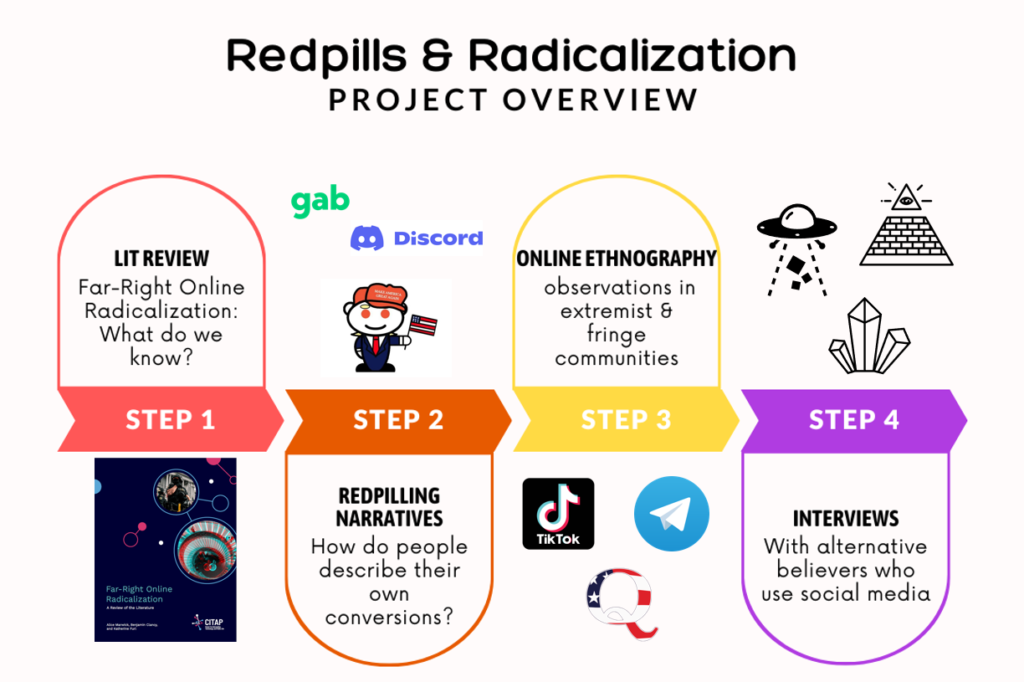The Intellectual Journey of Violent Racists, Conspiracy Theorists, Flat Earthers, and Other Americans on the Fringe
I’m currently writing my third book!
Down the Rabbit Hole explores how everyday people become deeply invested in alternative knowledge systems online, from conspiracy theories to DIY investigations, through practices that feel like research, community, and discovery. Rather than treating disinformation as the product of ignorance or manipulation, the book shows how participatory platforms foster vernacular research cultures where people learn to mistrust institutions, privilege personal experience, and embrace “generous epistemologies” that validate multiple, often conflicting, truth claims. Drawing on years of qualitative research, it follows how these communities construct “populist expertise,” remix evidence, and model research as an accessible, empowering activity—even when it leads to harmful or misleading conclusions. At its heart, the book reveals why conspiracy thinking has become an everyday mode of sense-making, how it fills gaps left by failing institutions, and what it means for democratic life in an era when anyone can produce knowledge, but not all knowledge leads toward truth.
This project began as an attempt to answer the question: Why do people believe extremist, conspiratorial, and fringe content they encounter on social media?
I received a Carnegie grant in 2020 to conduct the research that became this book. The project pitch was:
The rise of far-right extremism in the United States and across the world has led to political fractioning, violence, and a mainstreaming of hateful content. Many different far-right groups use the internet to recruit others to their ways of thinking, a term colloquially referred to as “redpilling.” There is a strong popular belief that exposure to extremist content online leads to far-right radicalization and even violence. Understanding why individuals commit ideologically motivated mass violence is of the utmost importance, as is determining the role of social media platforms in hosting and amplifying harmful content. However, the conventional wisdom around online radicalization is deeply simplistic and unsupported by evidence. This project questions popular and scholarly narratives of redpilling and online radicalization, asking instead how and why people come to believe fringe, false, or extremist viewpoints that they encounter on social media platforms
Here’s the slide I use to describe it:

Publications from this Project
- Marwick, A., Pippert, C., Furl, K., & Schnabel, E. (2025) “Shapeshifters and Starseeds: Populist Knowledge Production, Generous Epistemology and Disinformation on Conspiracy TikTok.” Social Media & Society, published online before print. [Open Access]
- Pippert, C., Furl, K., & Marwick, A. (2025) “True Believers, Entertainers, and Skeptical Scholars: Claims and Frames on Conspiracy TikTok.” Journal of Information Technology & Politics, published online before print. [PDF]
- Marwick, A. & Furl, K. (2025) “Mountains of Evidence: Processual “Redpilling” as a Sociotechnical Effect of Disinformation.” International Journal of Communication. [Open Access]
- Marwick, A., Boyles, D., Donnelly, M., Kaczynski, S., Ringel, E., Smith, J., Whitmarsh, S. & Yabase, C. (2024) “Child-Sacrificing Drag Queens: Historical Antecedents in Disinformative Narratives Supporting the Drag Queen Story Hour Moral Panic.” Women’s Studies in Communication 47(4): 459-479 [Pre-Print]
- Marwick, A. & Partin, W.(2022). “Constructing Alternative Facts: Populist Expertise and the QAnon Conspiracy.” New Media and Society. [Open-Access]
- Marwick, A., Clancy, B., and Furl, K. (2022). “Far Right Online Radicalization: A Review of the Literature.” Bulletin of Technology & Public Life. [Open Access]
- Kuo, R. & Marwick, A. (2021). “Critical Disinformation Studies: History, Power, and Politics.” Harvard Kennedy School (HKS) Misinformation Review, 2(3). [Open Access]
- Marwick, A., Kuo, R., Cameron, S. J. & Weigel, M. (2021). Critical Disinformation Studies: A Syllabus. Center for Information, Technology, & Public Life (CITAP), University of North Carolina at Chapel Hill. [Open Access]
- Marwick, A. (2018). “Why Do People Share Fake News? A Sociotechnical Model of Media Effects.” Georgetown Law Technology Review 2: 474-512. [Open Access]
Funders



Proudly powered by WordPress